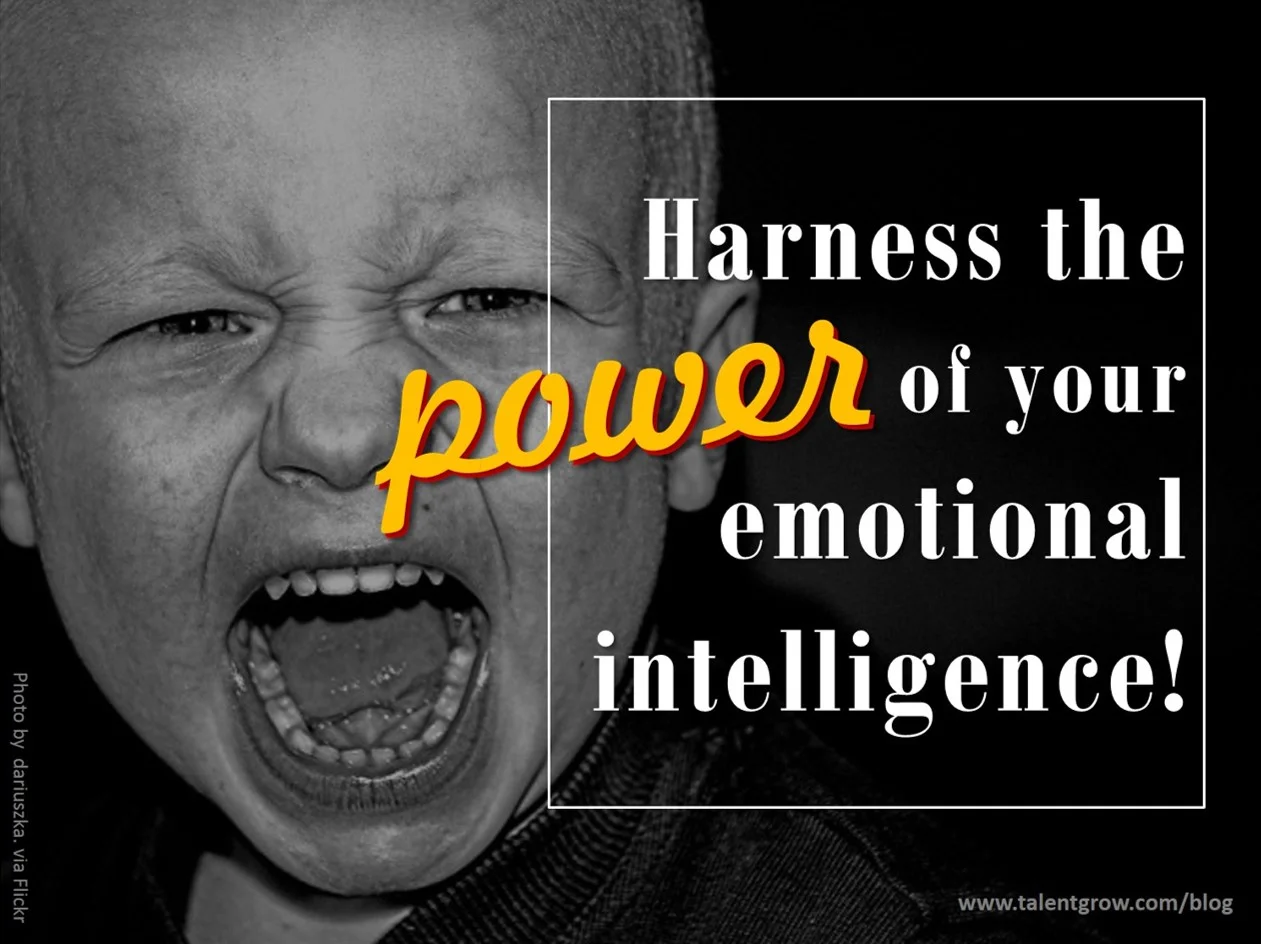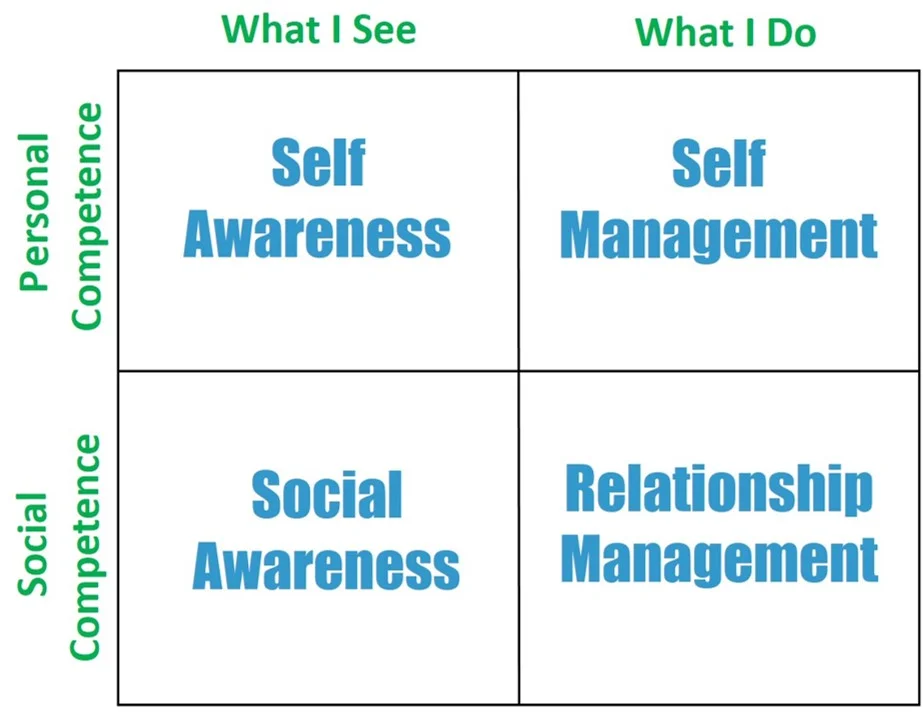Harness the power of your emotional intelligence!
/You've heard the term emotional intelligence (aka EQ) bandied around. Do you know what it means? If not, you might have fallen for the common myth that being emotionally intelligent means being more emotional. That's really not the case. What being emotionally intelligent actually means is becoming more aware of your own and others' emotions, increasing your capacity to manage your own emotions and take into account those of others, so that you can increase your ability to be more, not less, rational in your actions. Your communication and your relationships will improve when you harness your emotional intelligence! [click to tweet this - you can edit it first]
Some wise people agree:
"Research shows convincingly that EQ is more important than IQ in almost every role and many times more important in leadership roles. This finding is accentuated as we move from the control philosophy of the industrial age to an empowering release philosophy of the knowledge worker age.” ~Dr. Stephen Covey, author of the 7 Habits of Highly Effective People
“In the fields I have studied, emotional intelligence is much more powerful than IQ in determining who emerges as a leader. IQ is a threshold competence. You need it, but it doesn't make you a star. Emotional Intelligence can.” ~Warren Bennis, renowned leadership pioneer, author and researcher
"A leader's intelligence has to have a strong emotional component. He has to have high levels of self-awareness, maturity and self-control. She must be able to withstand the heat, handle setbacks and when those lucky moments arise, enjoy success with equal parts of joy and humility. No doubt emotional intelligence is more rare [sic] than book smarts, but my experience says it is actually more important in the making of a leader. You just can't ignore it." ~Jack Welch, former chairman of General Electric, speaking to the Wall Street Journal
So what exactly is emotional intelligence?
There are several ways to explain it, some more complex than others. I've studied the gurus (Goleman, Salovey and Mayer, Bar-On, Boyatzis, and Bradberry, among others) and have become certified in two different EQ (Emotional Quotient) assessment instruments. In my opinion, to make this knowledge accessible and actionable to business people, it should be as simple and practical as possible. I've really liked the four quadrant depiction of EQ by Bradberry and Greaves and found it useful for helping leaders and high-potential future leaders understand the concepts. Here is the gist.
The first two skills focus on you:
Self-awareness is your ability to accurately perceive your own emotions in the moment and note your emotional patterns across situations. It involves knowing your typical triggers and reactions to particular kinds of events, challenges, and even people.
Self-management is your action – or lack thereof – as a result of experiencing these emotional reactions to specific situations or people. You can't really do this if you lack self-awareness.
The last two skills focus on how you deal with other people:
Social awareness is your ability to read other people’s emotions accurately and gauge what they are feeling, even if it’s very different from how you are feeling. It's all about the ability to see things from the other person's perspective.
Relationship management is the product of the first three emotional intelligence skills. Successful relationship management is the result of your ability to use your awareness of both your own emotions and others’ emotions to create successful interactions. Relationship management means communicating effectively and managing conflict productively.
How to harness your EQ for improved communication and relationships
Since leaving your emotions at the door is not one of your options, nor is it for others with whom you work, you have to take all this stuff into consideration when interacting with them. While I could write about this for days and days, the bottom line is that you need to do these four things:
- Ratchet up your ability to recognize your own emotional state. Learn to notice what emotions you're experiencing, and ideally, learn to notice them when they're still what I call "baby emotions" -- low intensity versions of the emotion. That way, when 'angry' starts to bubble up, and it's still really just 'irked' or 'annoyed', you will be much better able to manage it than if you wait for it to boil over into full-on 'rage'. Your body actually gives you signs. You have to learn to listen to them.
- Learn to let your rational brain have the last word on your actions when emotions are present. Increase the frequency and quality of communication between the emotional and rational centers of your brain and let your rational brain override emotional reactions that are either not merited or not in your best interest.
- Become a better reader of others' emotional states. Be curious and observant and notice how your conversation counterpart is feeling. Don't brush the clues under the proverbial carpet and ignore them. Take notice and incorporate them into the rest of the data you're thinking about when making decisions about what's the best approach. Check your assumptions and confirm by asking them questions that show empathy and awareness of their reactions. This will help you avoid acting on unfounded assumptions and also win your relationship 'points' for caring to notice AND confirm.
- Put it all together to craft savvy, emotionally-intelligent communication messages and manage your relationships. By pulling all the data together - both emotional and rational - into your strategy for choosing what to say and how to say it, you'll be much more likely to increase empathy and trust and win the hearts and minds of those you work with. It's not easy and doesn't happen over-night, but it is absolutely a learnable skill that you'll benefit from practicing and improving.
What's been your experience? What's your number one action items after reading this post? Let's hear it in the comments below!
Sign up to my free weekly newsletter and get more actionable tips and ideas for making yourself a better leader and a more effective communicator! It’s very short and relevant with quick tips, links, and news about leadership, communication, and self-development. Sign up now!
Also, subscribe to my podcast, The TalentGrow Show, on iTunes to always be the first in the know about new episodes of The TalentGrow Show! http://apple.co/1NiWyZo
You Might Also Like These Posts:
Vlog: Can You "Leave Your Emotions at the Door?"
3 research-based tricks to help control emotions during critical conversations
News: Halelly Azulay certified to administer the Bar-On EQ-i instrument



